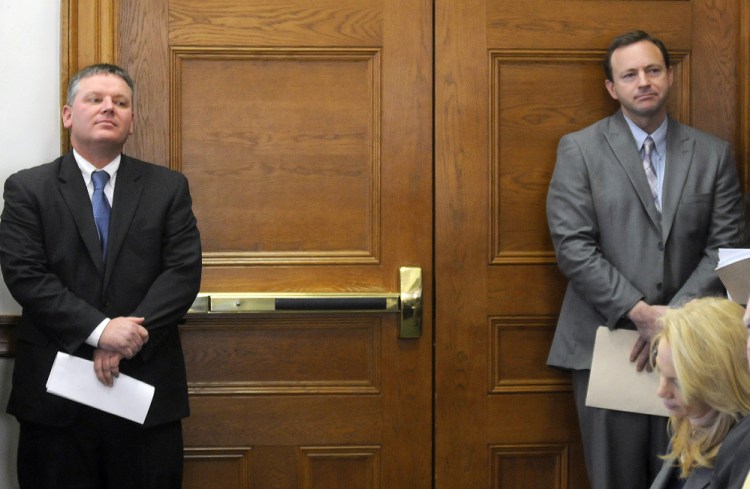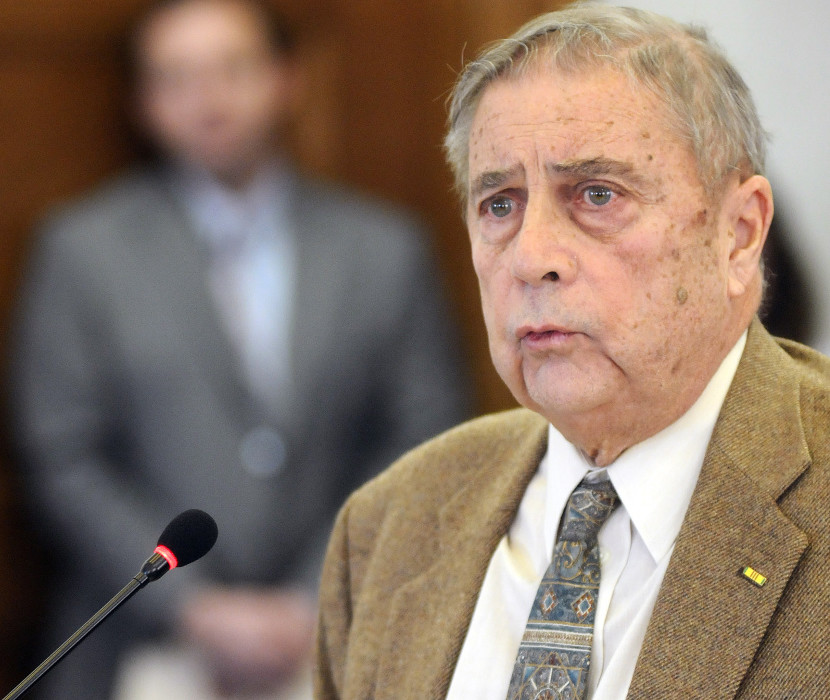AUGUSTA – Maine’s public safety commissioner told lawmakers Tuesday that he no longer needs emergency funding for 10 additional drug agents, a development that may erode support for a $4.9 million drug proposal under review by the Legislature.
Commissioner John Morris said the LePage administration has found enough money in Gambling Control Board reserves to pay the 10 agents through the current two-year state budget. After that, the agents could be included in baseline funding, he said.
Morris spoke at a public hearing before three committees of the Legislature on a bill that aims to address Maine’s opiate addiction epidemic by allocating $4.9 million to a combination of law enforcement and treatment initiatives.
The bill, submitted by Republican Senate President Michael Thibodeau and Democratic House Speaker Mark Eves, includes $2 million to hire drug agents that Gov. Paul LePage has been pressuring the Legislature to fund for months, largely with repeated threats that without the new agents, he will call out the Maine National Guard to assist with drug cases.
The remaining $2.9 million in the bill would expand drug addiction treatment programs.
When the drug proposal was announced last month, LePage signed a financial order that allocated $781,000 from the gambling board reserves to the drug agents. That funding was seen as a way to jump-start the hiring process, and it was expected that lawmakers would have to appropriate more money to fully fund the new complement of drug agents.
But with no need for the drug agent funding provided in the bill, it’s not clear whether the bill will gain support from LePage, who has already voiced criticism of how the drug treatment funds would be spent. Republicans in the House have also been critical of the bill, saying the state shouldn’t spend more money on drug treatment until it evaluates the effectiveness of existing treatment programs.
Thibodeau, the Senate president, said in an interview that the gambling board reserve may be sufficient to fund agents until the fiscal year ends June 30, but it’s not clear yet whether a surplus will be available for the next budget year. He said the bill is still pertinent.
Morris’ announcement came as dozens of law enforcement officials, health care officials, drug treatment providers and victims of addiction were set to testify on the Legislature’s drug proposal. Thibodeau has described the bill as a down payment on other initiatives designed to tackle a drug epidemic that claimed more lives in the first nine months of 2015 than in all of 2014.
Portland Police Chief Michael Sauschuck told lawmakers that the drug epidemic is behind a spike in crime rates and constitutes a public health crisis. He also challenged assertions that treatment was readily available, saying that officers and emergency responders had administered the life-saving drug Narcan multiple times to revive people who had overdosed.
“At some point we need to break this cycle,” he said, adding later, “All of us in law enforcement are beating our heads against the wall looking for treatment options. We haven’t found it.”
Another woman broke down as she told lawmakers about her struggle to enroll her son in a treatment program. She said politics had “muddied the issue beyond recognition” and urged lawmakers to set aside ideological differences and tackle the problem.
The toxic political climate in Augusta is already providing roadblocks. On Tuesday, LePage vowed to veto the proposal during an interview on WVOM, a Bangor radio station. He also said the bill had been written to include treatment and recovery funding for Eves’ and Thibodeau’s “favorite companies.” The governor declined to name the companies during his interview.
The only entity specifically named in the bill is the Maine Association of Substance Abuse Programs, an organization comprised of several health care providers. Under the proposal, the association would receive $700,000 to establish or expand peer support centers.
LePage also echoed Morris’ comments about the need to fund the MDEA agents.
“We’ve already got the drug agents covered,” LePage said. “We found the funding and they (legislative leaders) were pissed. Now they’re coming in for a piece of the action.”
House Republicans said in a press conference Monday that they cannot support fast-tracking the drug bill because of concerns about accountability for the $76 million already being spent on treatment programs. They did not specify whether particular programs raised their concerns, how existing services should be evaluated or how long an assessment would take.
The governor’s veto threat, combined with resistance from House Republicans, creates significant hurdles for the bill’s passage. Democrats control the House, however, they don’t have enough members to override a gubernatorial veto without Republican assistance. Overturning a veto requires a two-thirds vote of the House and Senate.
The drug bill is one of a half-dozen measures designed to address an opioid epidemic gripping Maine and other states. Data released Wednesday by the Maine Office of Attorney General showed that heroin overdose deaths in Maine through the first nine months of last year had eclipsed the number of deaths for all of 2014 – 71 through Sept. 30 compared with 57 in 2014.
Attorney General Janet Mills, a Democrat, told lawmakers Tuesday that the drug epidemic “is raging and demands an urgent and comprehensive response.”
She added, “It is true that we cannot arrest our way out of this crisis. But by the same token, we cannot solve it without arrests.”
The legislators’ plan also would expand a program being used by the Scarborough Police Department that invites people who possess drugs or drug paraphernalia to turn them in to police and get help without facing arrest. The treatment and recovery funding includes $1 million for a new 10-bed detox unit in Bangor, $600,000 to increase access to residential treatment for the uninsured, and $200,000 for outpatient services. Another $600,000 would be devoted to doubling the number of recovery centers throughout the state.
The treatment and recovery spending plan has been applauded by members of the Maine Association of Substance Abuse Programs, but it also has been criticized for not funding medication-assisted treatment with methadone and buprenorphine – also known as Suboxone.
The discussion over medication-assisted treatment is expected to generate significant debate, activating ideological and philosophical differences between lawmakers with different views of how to address addiction.
Send questions/comments to the editors.




Success. Please wait for the page to reload. If the page does not reload within 5 seconds, please refresh the page.
Enter your email and password to access comments.
Hi, to comment on stories you must . This profile is in addition to your subscription and website login.
Already have a commenting profile? .
Invalid username/password.
Please check your email to confirm and complete your registration.
Only subscribers are eligible to post comments. Please subscribe or login first for digital access. Here’s why.
Use the form below to reset your password. When you've submitted your account email, we will send an email with a reset code.